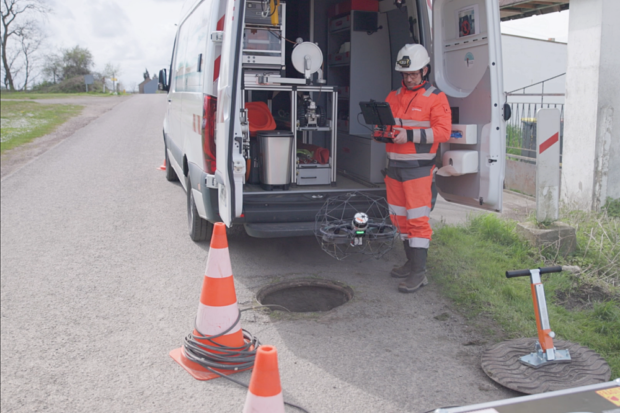In 2023 Veolia Water updated its drone fleet with the addition of a new Elios, with the aim of reducing inspection costs and inspection time, but also improving the safety of their workers. Now, the Elios 3 is considered “an irreplaceable tool […] and a new member within the team that we use every day”.
Veolia Water’s team shared a testimonial video about their main use cases for Elios drones and how it increases their efficiency.
Customer Needs
Veolia Water is the market leader in the Water and Wastewater Treatment industry. Long lines of underground sewer pipes managed by Veolia Water efficiently ensure that our cities and homes remain clean and hygienic. However, it is very hard to efficiently maintain these pipelines and prevent future issues from happening. Sewage lines may face blockages or excessive sediments that obstruct the flow of the wastewater, infiltrations, or even cracks in the pipe structure. Often, preventive measures become emergency actions needed to avoid hygienic disasters that could lead to significant health problems.
Traditional sewer inspection methods either require people to physically enter sewer pipes to identify issues in the system or to use small cameras attached to a snakeline. Sending people can be very dangerous because of the low oxygen levels that can be found in the pipes, sewage gasses (especially hydrogen sulfide), biological hazards, and high water levels. On the other hand, cameras attached to a snakeline require cleaning the sewer lines prior to the inspection, and their application is limited by potential blockages and visual capabilities.
Solution
Veolia Water, being at the forefront of innovation, was an early adopter of Elios back in 2016. Overcoming the difficulties and risks of the traditional methods, Veolia Water built a global fleet of Elios drones that are used to fly over obstacles and provide a better visual inspection of the pipeline. Flyability’s Elios drones allow Veolia Water to improve its maintenance planning by identifying future issues before they occur. Moreover, the Elios 3 increases safety during Veolia Water’s operation by removing the need to send people into dangerous places. Sewer inspectors can now collect visual and dimensional data from a safe distance.
Julien Maj is the Veolia Water service manager at one of the first agencies to own Flyability’s drone. He explained that “the original idea of collaborating with Flyability was to have a drone that was easy to fly” and capable of solving the constraints of a difficult environment like sewers networks. In addition, Elios
“gives us a structured and organized mapping of our installations. We also keep all the investigations in our tools for Geographic Information System (GIS), which allows our customers to see in real-time the renderings of their installations for which we have received a service delegation”.
The most important aspect for Julien, however, is that drone inspections are safer than traditional inspections because they remove the need for human entry in dangerous places.
“Today, thanks to Elios 3, we’ve effectively eliminated most of the risks associated with these confined spaces”.
As Julien explained in the interview, thanks to the new features of Elios 3, several benefits can be found compared to the Elios 2. In particular, Julien pointed out that the Elios 3 is much easier to fly for their operators, while the extended performance and range provide more value from each flight. Perhaps most importantly, there is a noticeable increase in the quality of the data thanks to the 4K camera and the LiDAR technology that produced 3D models compatible with their GIS systems and georeferencing. Elios 3 has also allowed Veolia Water to increase its service offering and customers in the industrial sector by “inspecting industrial assets like aeration passes or storage basins that they couldn’t do before.”
Results
Most users of Elios in sewer networks benefit from a 40% reduction in inspection costs per linear meter and almost half the time needed to inspect the same area. Florent Fardel, team leader at Veolia Water and head of operations in network maintenance, explains why.
“[Thanks to Elios], we are able to inspect assets without necessarily cleaning the collectors prior to our intervention. As a consequence, we have a much faster intervention. (…) The difference between a conventional ITV inspection and a drone inspection is the speed with which it can be set up and the resources required (…), which are heavily reduced”.
In addition, the included software Inspector allows for quick integration within Veolia’s digital reporting tools, ensuring a faster delivery to the end customers in compliance with the EN 13508 norm.
Conclusion
Elios drones are revolutionizing the world of inspections in sewer networks and Veolia Water decided to take advantage of this new technology to stay at the forefront of innovation. They are currently “using it every day” for their operations to tackle the industry challenges and Elios 3 has become the “new department’s agent”.
Source: Flyability

